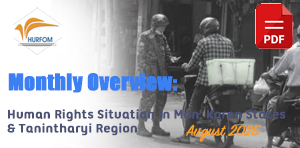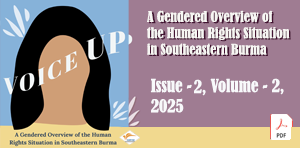Residents troubled by gambling in Three Pagodas Pass
March 26, 2013
HURFOM: People living in Three Pagodas Pass, a commercial hub that straddles the Thai-Burmese border, reported that corruption and illegal activities related to gambling and prostitution continue to afflict the town in 2013, with little intervention by local or state-level authorities. Out of the four administrative quarters in Three Pagodas Pass (TPP), Quarter 3 was alleged as the most notorious for gambling and corruption due to its large population of diverse ethnic groups and armed resistance members.
Earlier this year, a major from the Karen Peace Council reportedly built a permanent structure in Quarter 3 to house a new, 24-hour casino that touts card games, slot machines, and cockfighting. Residents reported in 2009 that another businessman, U Myo, opened a gambling center and brothel near Shwe U Dawn Lake that regularly offers card games, prostitution, drugs, and alcohol. In 2012, accounts surfaced that a local man was killed when a fight broke out between an indebted gambler and his loan shark. Now, residents were shaken again by reports that the Karen State government will review letters submitted by Thai owners of previously shuttered casinos in TPP requesting permission to reopen.
Local representatives of the Union Solidarity and Development Party (USDP) attempted to prohibit slot machines and gambling in TPP as part of their anti-poverty campaign, but a party spokesman described why the move proved unsuccessful.
“We could not manage to close all the gambling centers. We could only prohibit slot machines because many of the casinos are operated by Karen ceasefire groups and people who have ties to the authorities.”
According to a local source that asked to remain anonymous, various armed groups stationed around Three Pagodas Pass are also thought to be responsible for much of the area’s drug production. Residents allege that the local Burmese Army troops, in addition to more than 30 police stationed in TPP, are aware of the illegal drug manufacture and trade, but allow the activities to continue in exchange for bribes.
Many local people expressed frustration that young people are picking up gambling habits and lamented that some residents rely on gambling for income when job opportunities become scarce. They said the authorities know of the severe impacts gambling can have on impoverished families, but are dissuaded from addressing the issue because of the bribes offered by casino owners. Locals also claimed to pay between 30 and 50 Baht to members of the Border Guard Force for protection, but said the security personnel focus more on collecting taxes at tollgates than tackling illegal activities.
“To advance the residents’ social development, there should not be any gambling, drugs, or human trafficking,” said a member of an armed group who chose to remain anonymous. “First the government should clean those things out to promote the city. Unless the corruption and the gambling centers are gone, the villagers will not attain peace.”
Comments
Got something to say?
You must be logged in to post a comment.



















































